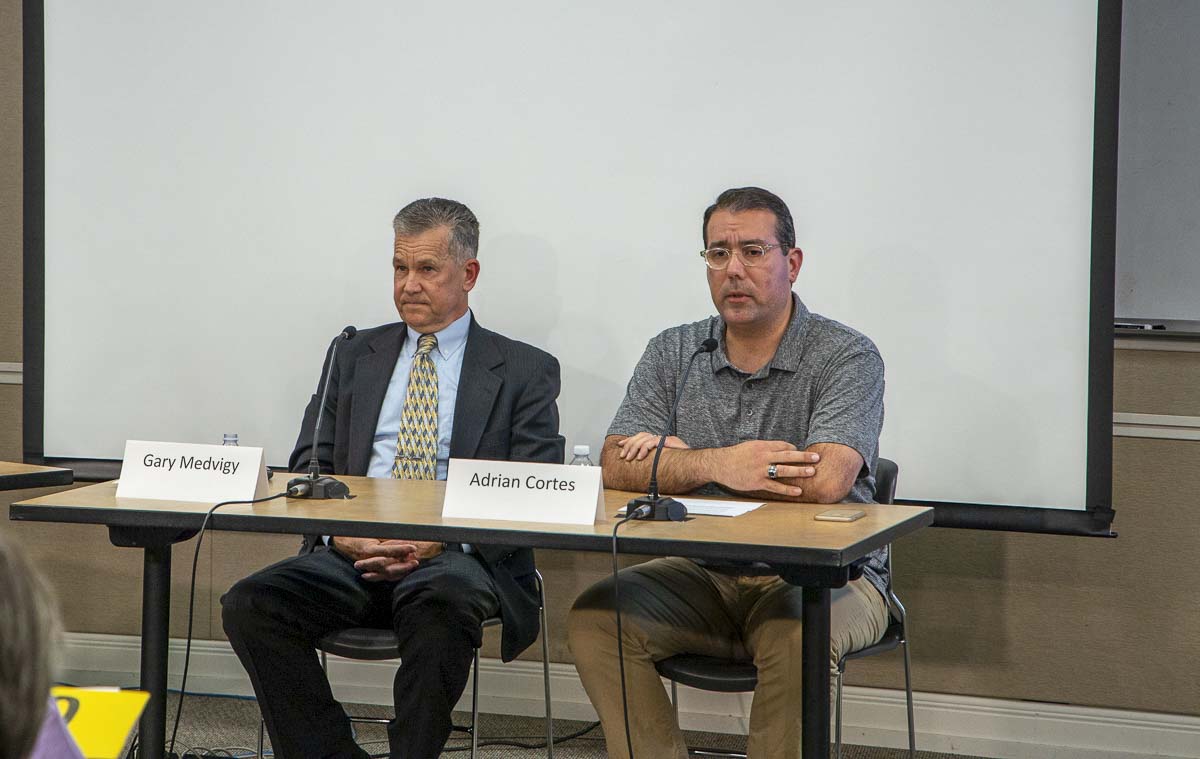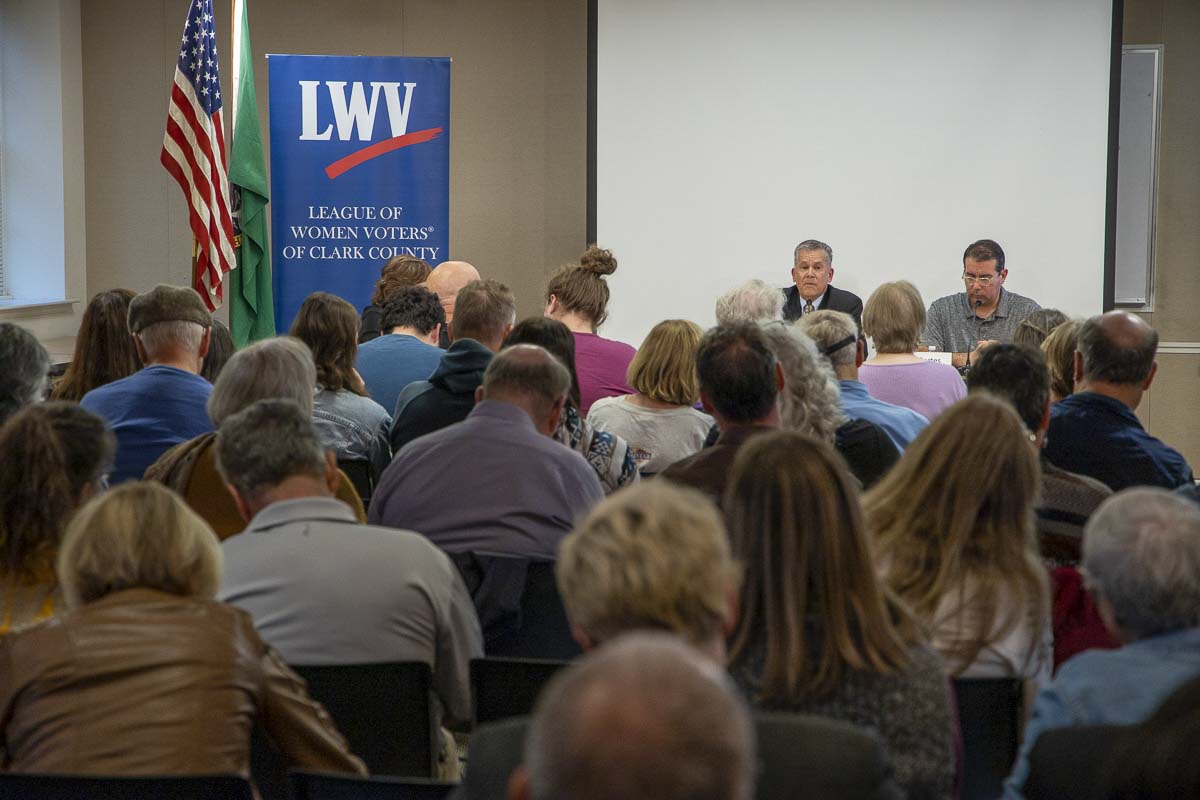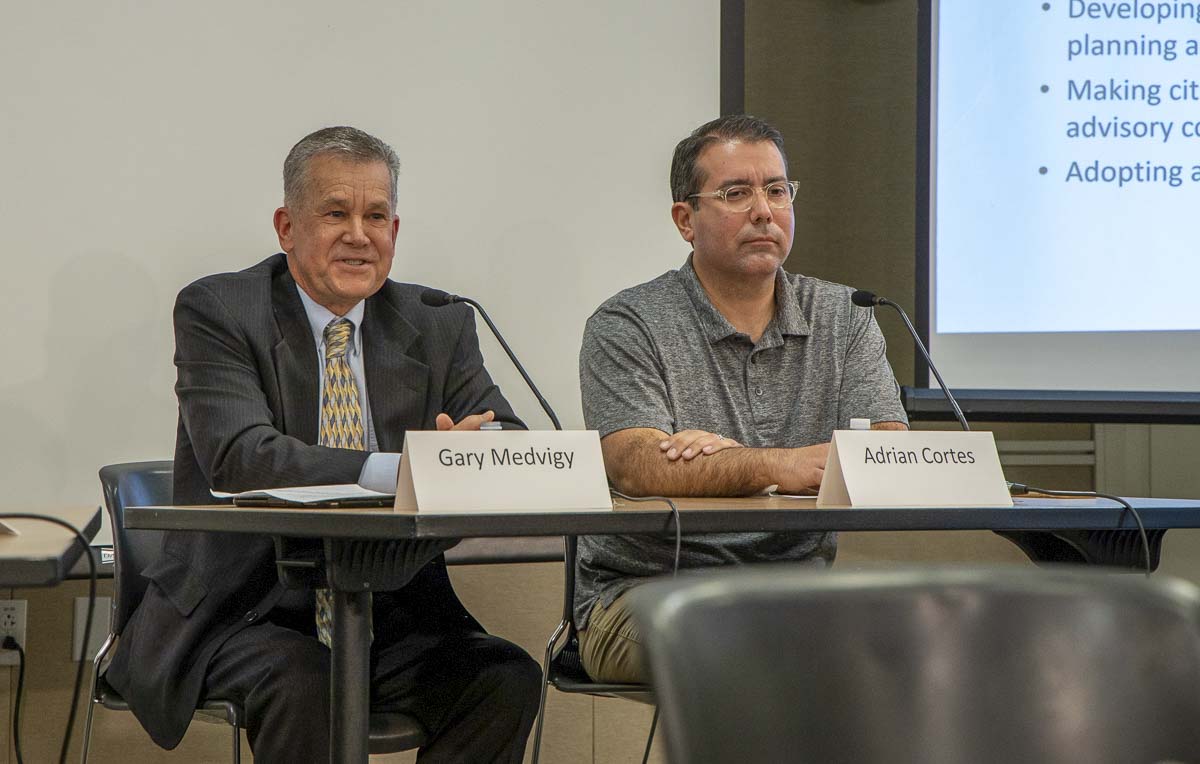Key differences between two candidates outlined in recent interviews
CLARK COUNTY — The results of next Tuesday’s general election could lead to a shift in the balance of power on the Clark County Council. However, even if the District 4 seat changes hands it’s unlikely to be a seismic shift like last year when Eileen Quiring became County Chair, Democrat Temple Lentz replaced Republican Jeanne Stewart in District 2, and former judge Gary Medvigy was named to fill Quiring’s seat.

Despite his fill-in tag, Medvigy has quickly integrated himself into Clark County politics, turning his legal background into a chair seat on the Law and Justice Council, as well as sitting on the Southwest Washington Regional Transportation Council and the Council for the Homeless.
The retired California Superior Court judge moved to Clark County three years ago and says he recently also brought his 88-year old mother from Florida to the area. Medigy’s wife of 35 years went to the University of Oregon, and his four adult children all live nearby. Two are also serving in the military, including an adult daughter who was one of the first women to serve as an artillery gunner in Afghanistan.
Medvigy is facing off against a familiar face in local politics. Adrian Cortes is currently serving his second stint as a Battle Ground City Council member, and serves as chair of the C-TRAN Board of Directors. He previously served four years as chair of the Battle Ground Planning Commission.
Cortes moved to Battle Ground at the age of 5 and graduated from Prairie High School. During the day he works as a special education teacher in the Camas School District, while working to get his doctoral degree in education and helping to raise 14- and 8-year-old daughters with his wife of 16 years.
District 4, which covers Battle Ground, Amboy, Yacolt, as well as most of Camas and Washougal, has been traditionally rather conservative since the Home Rule Charter was implemented. Medvigy won the primary ballot with 58 percent of the vote.
NOTE: Clark County Today was in contact with both candidates to arrange for interviews, however Mr. Cortes failed to schedule in time for this publication. In the interests of fairness, we declined a one-on-one interview with Councilor Medvigy and are basing this report on interviews the candidates did with CVTV.org and the League of Women Voters of Clark County.
Taxes
In keeping with a Democrat running for one of the more conservative seats on the Clark County Council, Cortes has repeatedly said he would not vote to approve a property tax increase while Clark County “continues to suffer from poor planning and continual missteps costing taxpayers millions.”

During an interview with CVTV.org in September, Cortes maintained that he had voted no on property tax levy increases as a Battle Ground City Council member, contrary to claims by Medvigy.
“If you look at the records and pull a public information request, you’ll see that I didn’t vote for property taxes,” said Cortes. “Quite the contrary, this year in Battle Ground, we’re actually going to be voting to reduce our utility taxes by 10 percent.”
Cortes is referring to a utility tax reduction approved by city council, contingent on voters approving annexation into Fire District 3 in February. The reduction is intended to offset an increase in the property tax bill for Battle Ground homeowners as part of the annexation.
A group calling themselves Activate Republicans Vancouver, WA took Cortes up on his offer, and claims he isn’t being fully truthful in his claim. Last November, Battle Ground City Council took up a one percent property tax levy increase. According to records from that meeting, Cortes was the lone member of the council to vote yes.
Cortes also voted to approve property tax levy increases in 2012 and 2013, and voted in favor of a utility tax increase last year as well.
“You will not hear me say ‘no new taxes’ because, especially in a structural deficit time period, that’s irresponsible,” Medvigy said during his CVTV interview. “I understand that my opponent voted to increase property taxes just last year in the city of Battle Ground. Fortunately for those constituents there, everyone voted it down.”
Land use
The candidates also differ greatly when it comes to their views on land use. Cortes has gone on record saying he believes the proposal to develop part of the county-owned Chelatchie Prairie rail line in Brush Prairie is the wrong plan.
Cortes tells Marvin Case in the CVTV interview he’s in favor of job creation in the Vancouver area.
“But once you go outside that and you go into the more rural areas, the last thing people want in their backyard … is an asphalt plant, or heavy chemical fertilizer plant, or whatever it may be,” said Cortes. “I think we need to have a broad amount of citizen input on what goes there and has to be appropriate to the area.”

Cortes added he would like to see the state legislature revisit the 2016 law that allowed for development along the shortline railroad, to fill in some of the gaps, such as whether the county can run sewer lines to the area, something not currently allowed outside of city limits under the state’s Growth Management Act, but necessary to the development of heavy industrial.
Medvigy counters that there was plenty of public input in the process of developing the Freight Rail Dependent Uses plan, and it is being taken into account. Currently, the county is tied up in a legal dispute with the operator of the rail line, and no development will happen while that’s going on.
“I don’t intend to industrialize the rail line, but there are some places where it would be appropriate,” said Medvigy. “It would be great to preserve it, put it to good use, so it is sustainable. There are some agricultural uses of it right now. We’d like to see more of that.”
The candidates also differ when it comes to pending development around the 179th Avenue/I-5 area. The county recently approved a plan to fund road improvements there, clearing the way to lift an urban holding designation and allow residential and commercial development in the last developable area within the city of Vancouver’s urban growth boundary.
“The urban growth boundary is the line in the sand,” said Medvigy during a League of Women Voters of Clark County candidate forum earlier this month. “That’s how we keep our rural lands rural.”
Medvigy was the main proponent on the council of putting funding for the 179th area traffic improvements on the backs of developers through increased Traffic Impact Fees, as well as higher school impact fees improved shortly after funding was approved.
“We took the most conservative approach as far as estimating costs on the construction,” Medvigy said. “I mean, none of this has been fully designed yet, so we don’t know the exact costs. So we overestimated what the costs would be, and then underestimated what the revenues would be. So we feel very confident that we’ve got a good funding package in place to get this going.”
Cortes said he has concerns over how the funding was approved, leading to the third-highest developer fees of any traffic impact fee area in the state.
“It’s going to just share more of the burden onto not only the builders but also to, ultimately, the home buyers,” said Cortes. “I think we should have done a visioning initiative first, to ask the people in the area, ‘how do you envision this area looking like, what do you envision going in here?’”
Cortes added he shares the concerns of Councilor Temple Lentz, who voted against the funding plan, that the high fees could discourage development in the area, especially in the event of an economic recession, and leave the county holding the bag for the cost of traffic projects. Medvigy says their “plan B” is that projects in the area would be paused in the event of an economic slowdown.
Interstate 5 Bridge
The candidates have also taken differing approaches to the conversation over replacing the aging Interstate 5 Bridge.
Medvigy has used his position on the Regional Transportation Council to push officials for answers to why the idea of a third crossing hasn’t been pursued, despite the fact that earlier long-range plans showed a new crossing as vital to the area’s growth.
“It’s been 20 years or more that people have envisioned an additional crossing and done nothing for that future planning piece,” Medvigy told CVTV. “It would be great if our governor, or this bi-state legislative committee would say let’s build a bridge in the next 10 years, but at the same time we need to make future plans.”
As president of C-TRAN’s Board of Directors, Cortes sees a new I-5 Bridge as an opportunity to include dedicated lanes for mass transit, but not necessarily the light rail expansion being pushed for by the governors of Washington and Oregon. Cortes told CVTV he took a trip to Olympia to tell Gov. Jay Inslee that his focus on light rail is misplaced.
“I have no problems if we want to put the infrastructure on the bridge for light rail decades into the future,” he said, “but for right here, right now we need to focus on bus rapid transit. And so, whether I’m elected to this position or not, I’m going to continue to champion that.”
Cortes added that he’s happy to see Oregon finally talking about plans to alleviate congestion at the Rose Quarter, considered to be the primary southbound bottleneck on the interstate system.
Quarry complaints
Asked how they would address growing complaints surrounding many of the county’s rock quarries, Cortes told CVTV he believes the issues demonstrate a lack of leadership within county administration.
“I recognize the value the rock quarry plays to our community, in terms of development and for houses and roads and schools,” said Cortes. “I think, though, that they have definitely not been playing by the same rules … and the county certainly hasn’t. So I think there needs to be more accountability in terms of the operator as well as the county.”
Medvigy said the county is working quickly to deal with lawsuits surrounding Livingston Mountain Quarry, and tasking county staff with better enforcing existing rules.
“We are trying to get the operators to be better neighbors, but we do need the rock,” said Medvigy, noting that problems have increased partly as new homes pop up closer to existing quarries. “So we’re trying our best to get control of it. And I think we’re making progress.”
Biggest challenges
Asked what they view as the biggest challenges facing the county, Cortes said he believes the permitting process is broken, with many people waiting 5-6 weeks for an application to be approved.
“That’s absolutely ridiculous,” he told CVTV. “In the city of Battle Ground, and in most other jurisdictions that I’ve talked to, you can get a permit within, you know, four to five days when you’re looking to build your house.”
Medvigy said he “totally agrees” that Community Development needs some serious attention, but that reforms are already well underway, including a committee in place with a consultant under contract.
For his greatest challenge, Medvigy said it’s the Comprehensive Growth Plan, which the county is gearing up to revisit.
“That needs real reform to provide relief, not only to individual property owners, but to the vast majority of rural property owners in the unincorporated area,” Medvigy said, noting that there needs to be a robust public input process as part of that reform.
“Gary just moved here from California, and so he definitely brings a different lens,” responded Cortes. “Gary’s never been through a Comprehensive Plan update. I have.”
“I’ve been married 35 years. I’ve worked hard. I’ve worked pretty much two jobs at one time, both in the civilian world and in the military world,” concluded Medvigy. “I have been a conservative, I have been a Republican my whole career. I never switched. I never pandered to the public. I’m an independent person.”
More information
For more details on each candidate, check out their voters’ pamphlet profiles here.
Adrian Cortes campaign website




